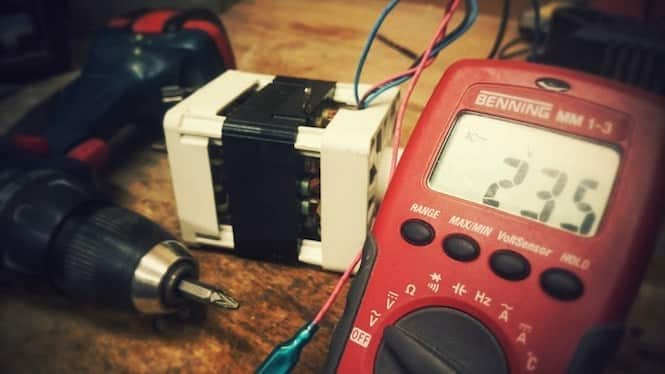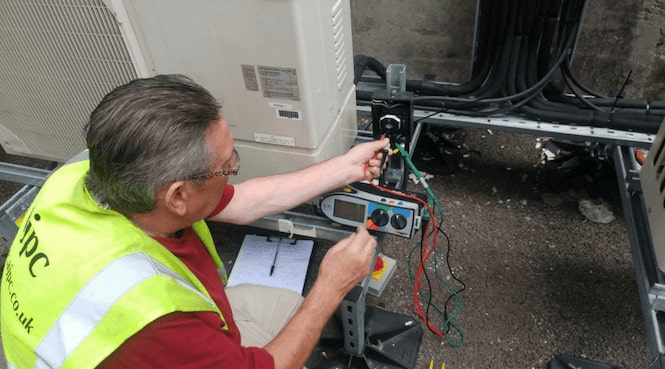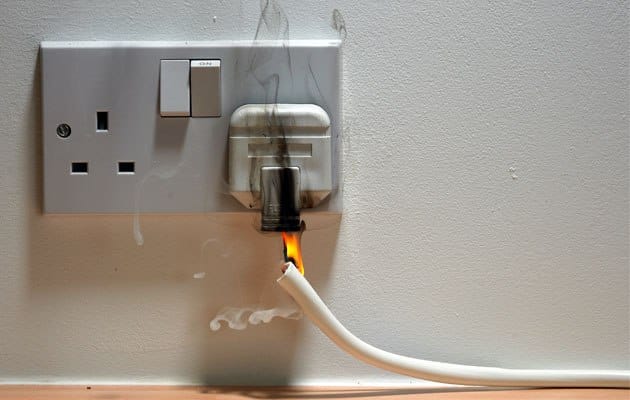Find My Local Expert How To Safely Identify Electrical Faults...
Read More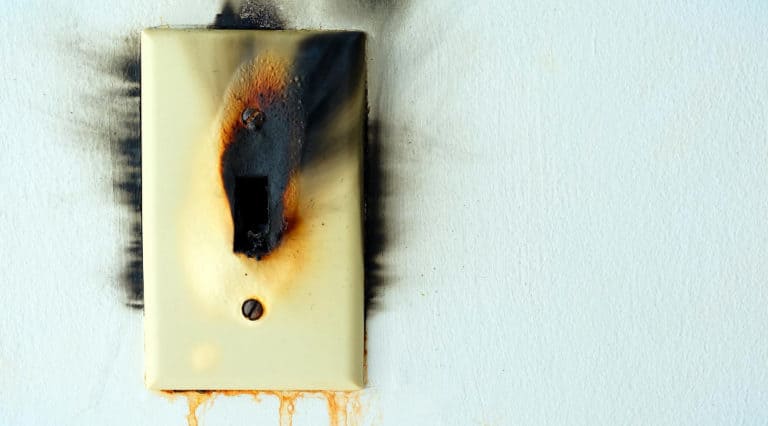
Beware of the Fishy Smell in Your Home!
Unexplained fishy smells in your home typically come down to one of two causes; somebody has left a fish out on the side, and you didn’t know about it, or you have electrical problems.
Now, given that the chances of the former happening and you not noticing once the smell gets out there are pretty slim, so there’s a good chance that unexplained fishy smells in your home point to an electrical problem. And if you’re a bit confused at the connection between electrical problems and fishy smells, you wouldn’t be the only one. In this post we will go over where this fishy smell comes from, why it happens, what you can do to prevent it happening, and what to do when it does happen.
What are the Reasons of the Fishy Smell?
All your electrical appliances, outlets, and fixtures are fed their electricity through wires in your walls and under your floorboards. Wireless electricity may be making inroads in the mobile device charging market, but we’re still a long way off of not needing wires in everyday use.
Now, even though those wires are safely stashed away out of sight and where you can’t reach them, they are still extremely dangerous.
The electricity going through the wires is enough to give anything from a sharp pain on the point of contact all the way up to a fatal injury depending on the circumstances. Additionally, if two unprotected wires touch each other, it can cause all manner of electrical problems. So electrical wires have to be protected from the outside world, and this is done using insulation.
Insulation usually comes in the form of a plastic-based coating around the wire, like a sleeve. This insulation is not conductive, so the electricity is kept safely contained within the wire. There are also heat-resistant chemicals in there to make things extra-safe, since electrical fires can be particularly devastating and hard to put out.
It is this combination of chemicals and plastics that give off that unexpected “fishy” smell when they heat up, but if they are heating up enough to give off that smell, there is a problem, and it needs dealing with quickly.
Is This An Emergency?
Assuming you don’t actually have a raw fish left out on the side, this is definitely an emergency. You see, despite the chemicals and insulation designed to protect against things like heat and electricity, they’re not actually meant to be forced into action. The idea is that they’re there if needed, but they shouldn’t be needed.
If there is enough heat being generated from your electrical wiring to cause it to burn enough to release that smell, you are in the midst of a potentially serious electrical problem.
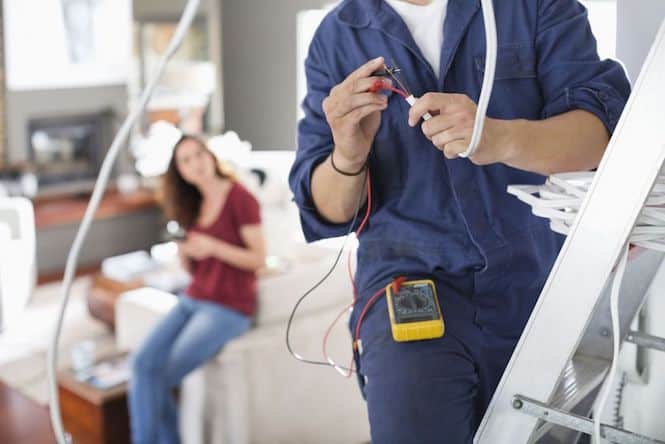
Understand that the best case scenario is that the insulation will continue to burn until it is used up and then there will be exposed electrical wire in your home. This is unlikely, however. The more likely scenario is that something will catch fire, and as the wires are almost all hidden away behind walls and under floorboards, that fire could get a major foothold before you even know it’s there.
Why Do Electrical Wires Overheat?
Firstly, your electrical wires shouldn’t overheat. Wires overheating—or even getting warm—is a sign that something is amiss. When electricity travels through a medium, it experiences resistance, and that resistance generates heat. In the proper operation of electrical systems, electricity will never be forced to pass through a medium that creates any more resistance than it is designed to. For something like a lightbulb—which produces light by forcing electricity through an electrically resistant filament—the heat is generated on purpose and is safely contained in an airless bulb where it cannot damage anything or start a fire. For regular wires, the electricity passing through them should never be greater than the wires’ capacity to safely carry without generating excess heat.
When something like a lightbulb finds itself taking more electricity than it can handle—either through a power surge or from the slow deterioration of the electrical filament, the filament melts and breaks the circuit but the lack of air and anything flammable around it prevents anything more drastic than needing a replacement bulb. With electrical wiring, there is no protection for such an eventuality because it’s not meant to happen.
If it does happen, the wire will continue to get hotter until either a stable state is reached, or the wire melts. Unfortunately, the chances are there will be something flammable nearby, and that may well catch fire before the wire melts.
What are the Most Likely Problem Areas
Unless your wiring is very old, has been installed to a substandard specification, or you have dramatically overloaded your electrical circuits by hooking up too many high-powered appliances, the most likely cause of overheating wiring is a poor connection at a socket, switch, or junction box. Basically anywhere where a wire is connected up to something.
Obviously the prime candidates if you experience this smell would be any terminals that have been tampered with recently, such a light switch that has been changed, or an outlet that has been added. If the wires were connected up poorly, resulting in less contact between the wire and the terminal, it reduces the capacity of the connection, resulting in a lower capacity to carry electricity and more resistance.
Physical damage to the wires is another potential cause, and this can come in two main flavours; fatigue from excessive movement and damage from critters. The former will probably be somewhere out in the open as the wire would only get this kind of fatigue if it is being moved regularly. The latter happens when mice or rats have been gnawing at it, and so could be anywhere that those animals could get to.
What To Do?
The first thing you should do if you experience this smell is shut off the power. Unless you know the exact location and of the problem and which breaker is associated with that part of your electrical systems, you should just shut off all the power. If you catch the problem early enough, this should be enough to prevent any damage from being done. Other than the faulty wire itself, of course.
Once your electricity is shut off, get on the phone and contact an emergency electrician. Unless you know exactly where the problem is and what to do, it’s not worth potentially starting a fire when you switch the power back on.
Speaking of fires, once you’ve got your emergency electrician on the way, you should check to make sure you weren’t too late in shutting the electricity off. It can be difficult to follow your nose to the source of a smell like this because it is quite pervasive, but do your best to get near the source of the smell and check for fire. If the smell appears to be coming from a socket, light switch, or something like a wall vent, any potential damage or fires could be behind the wall. Feel the wall to see if there are any hotspots that indicate a fire behind them. If you find any, don’t waste time in calling the fire service, as the sooner the fire is dealt with, the less damage will be done to your property.
What are the Other Signs of Electrical Faults to Watch Out For?
A fishy smell from the walls of your home is not the only sign of an electrical fault, of course. Here are a few other things to look out for.
#1 Breakers Tripping
The fuse board’s job is essentially to perform a controlled circuit failure. Rather than letting a wire melt and start fires as described above, the breakers and RCDs in your fuse board will detect the problem and cut the power automatically. If you find your breakers are tripping constantly, something is causing that to happen and should be investigated.
#2 Flickering Lights
A single light flickering is probably just a single fixture or bulb that’s failing, but flickering across all of your lights is a sign that there is a bigger problem to deal with.
#3 Strange Noises
Humming or crackling from electrical fixtures, outlets, or switches is never a good sign.
#4 Scorch Marks
Usually around electrical outlets when they happen, scorch marks are a sign that things have been getting too hot somewhere nearby.
Conclusions
As strange as it may seem, that fishy smell in your home probably doesn’t have anything to do with fish, and can be a pretty urgent matter that could lead to considerable property damage if not dealt with quickly. If you find yourself facing this situation, remember to remain calm but urgent in your response. Shut the power off, call an electrician, and make sure there are no signs of a fire already underway.
That being said, as long as your electrical systems are professionally installed, properly maintained, and you don’t overload anything, you should never experience this problem.
You May Also Like...
Guide on Electrical Inspection and Testing
Find My Local Expert A Guide about Electrical Inspection and...
Read MoreEmergency Electrician Service
Find My Local Expert when you need an emergency electrician...
Read MoreElectrical Installation Condition Report
Find My Local Expert Everything You Need to Know About...
Read MoreElectrical Fault Finding
Find My Local Expert Understanding Electrical Fault Finding An electrical...
Read MoreElectrical Smell in Your Home?
My Trusted Expert Guarantee
Experts Have Been Vetted & Approved

